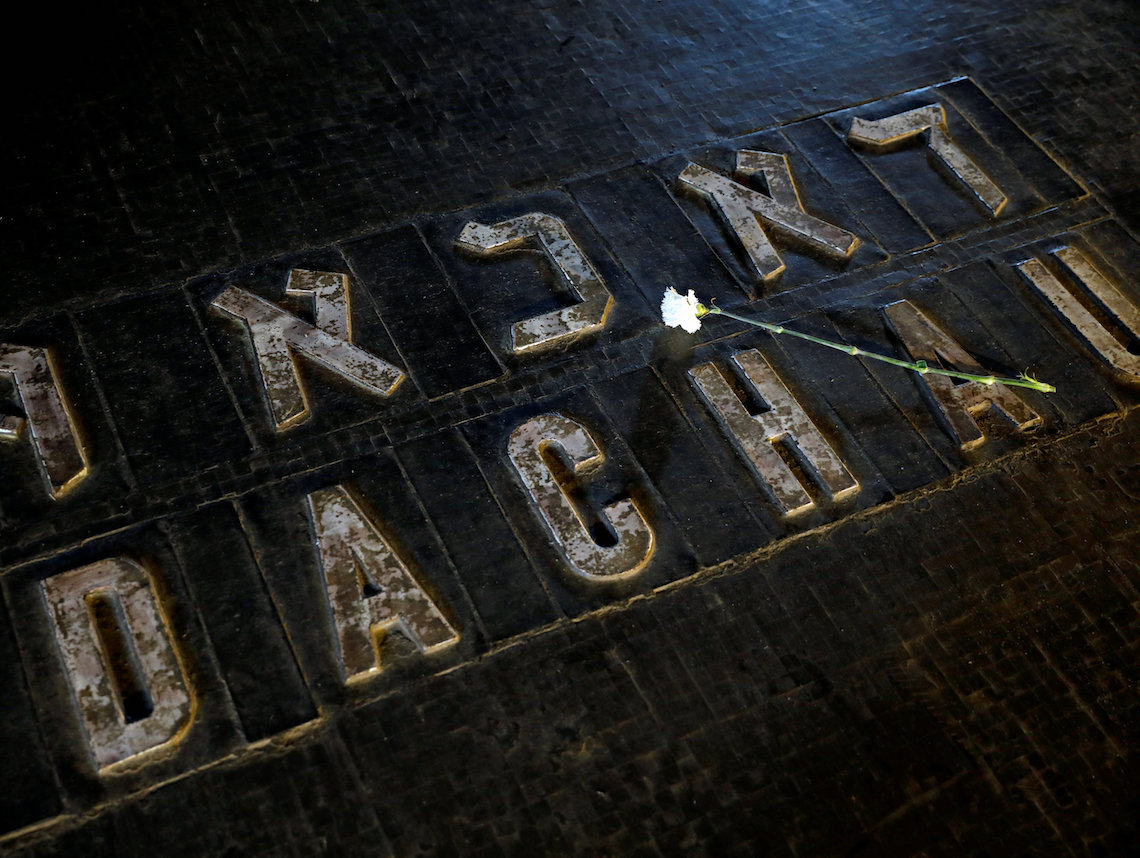 A flower is placed by next to the name of a former concentration camp inside the Hall of Remembrance at Yad Vashem. Photo by Amir Cohen/Reuters
A flower is placed by next to the name of a former concentration camp inside the Hall of Remembrance at Yad Vashem. Photo by Amir Cohen/Reuters I’m not sure how to view what happened at lunch today. Coincidence? Serendipity? Or “bashert”, the Yiddish word that means “meant to be”.
I know several now-middle-aged Germans who never met a Jew until, as adults, they traveled outside their country. Nearly twenty years ago, one such German was my seatmate on a long, delayed trans-Atlantic flight. Andreas, from Cologne, was happy when I mentioned that my mother was born in Germany; his expression, however, turned somber when I explained that we’re Jewish, and she and most of the rest of her family managed to escape their “heimat”, or homeland, in the years after Hitler came to power. Other relatives, of course, were not so lucky.
Whenever I meet young Germans, here or during my four trips to that country, I do my best to make relevant and real what seems like ancient history to them. We ended up speaking for hours about my family’s experience in the Holocaust and his family’s actions during the Third Reich. Although he knew neither Jews nor Shoah survivors, he was surprisingly sensitive to my stories and clearly moved by them.
Andreas and I became friends on that flight, and have stayed in touch since then. I visited him once in Cologne, and he’s visited me at my home in New York, where he travels every year for business.
He was in town this week, and we went to lunch at a pleasant Long Island restaurant overlooking a pond. The conversation inevitably turned to politics and history, and we discussed whether there is any basis for comparing America’s current leader to Germany’s long-dead Fuehrer. We spoke about his two sons, ages 14 and 11, and what they know of Germany’s history.
After we finished eating, we went outside to the restaurant’s balcony to take some pictures with the spring scenery. We were alone for a couple of minutes until an elderly white-haired woman stepped outside and asked us if it was OK to smoke there. I said I had no idea, and she apologized, saying she’d mistakenly thought we were restaurant employees. By that time I’d recognized her accent, and asked in Hebrew, “You’re Israeli, right?”
She was surprised, but laughed and confirmed my hunch. Continuing in Hebrew, I asked if she’d been born there. Again, laughter, and the response “What, you want to know my whole complicated life story?”
Well, I answered, I’m a reporter, and yes. Go right ahead! After she spoke for two minutes in Hebrew, I stopped her and said (in Hebrew), please repeat that in English, as I want my friend, a non-Jewish German, to hear this.
So Maya told us how she was born in Tel Aviv in 1938, but the following year, her parents inexplicably decided to return to Europe, where they’d been born, with her and her eight-year-old brother. To their horror, they soon were entangled in the Nazi web, fleeing from place to place, country to country, hiding in forests, being caught and escaping detention… all in all, a typical Holocaust survivor’s story (if it can even be said that there is such a thing). Maya only remembered the last, frantic years of the saga clearly, from ages four to six; she discovered the rest of the details years later from her parents and brother.
“And then”, she concluded, “we finally returned to Tel Aviv from Europe after the war ended, and we were all almost killed in a huge explosion. We made it into the shelter in the nick of time”.
With that, Maya said she had to get back to her friends, having decided to forego her smoking break for our entirely unexpected chat.
She went inside, and I turned to Andreas. He looked stunned, his eyes wide with astonishment at what he had seen and heard over the previous five minutes. I had to smile. “This is not exactly the kind of unplanned conversation you might have with a stranger in Deutschland, is it?”, I said. “In fact, I guess this is the first time you’ve actually met someone who survived the Holocaust”.
Andreas nodded. “You know”, he said slowly, shaking his head in disbelief, “I was thinking the most interesting thing I would tell my kids next week was about the 35-mile bike tour I took from Jersey City. But now I have a very different story to share with them.”























 More news and opinions than at a Shabbat dinner, right in your inbox.
More news and opinions than at a Shabbat dinner, right in your inbox.